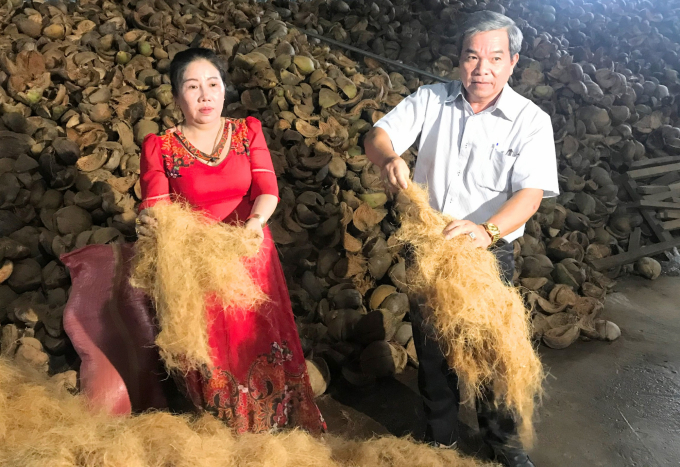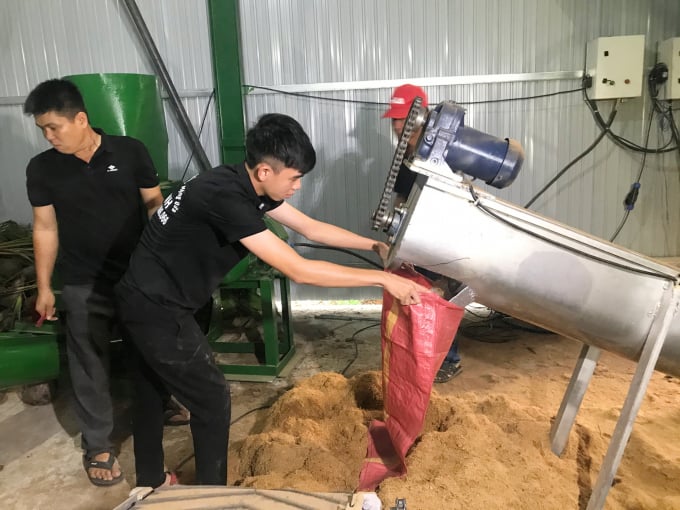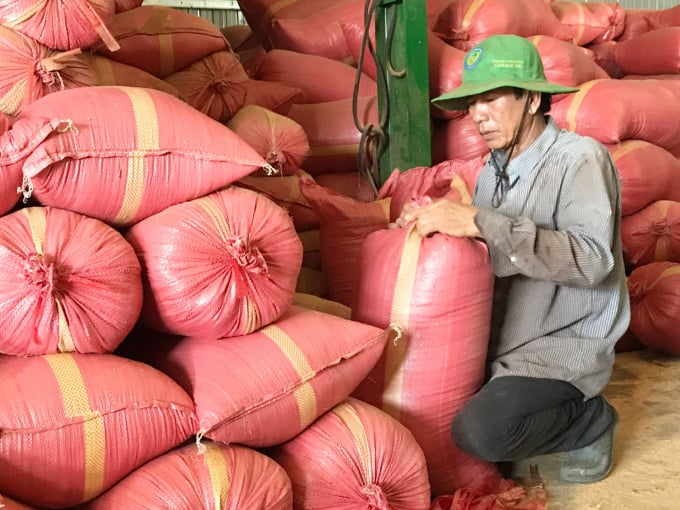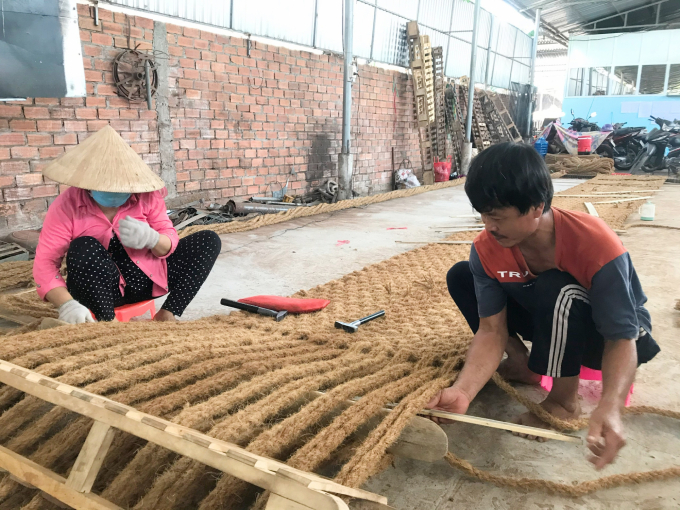June 20, 2025 | 16:02 GMT +7
June 20, 2025 | 16:02 GMT +7
Hotline: 0913.378.918
June 20, 2025 | 16:02 GMT +7
Hotline: 0913.378.918
From coconut shells almost discarded as waste, people are making high-value coir and cocopeat using coir extraction machine.

Coconut shells, when put through coir extraction machines, are turned into coir and cocopeat with export value. Photo: Minh Dam.
Currently, cocopeat is considered an important product and in great demand in the market. It is used as a replacement for soil in seedling planting. It is also processed into microbial and organic fertilizers... Flower villages in the Mekong Delta, especially Cho Lach district, Mo Cay Bac (Ben Tre), Sa Dec city (Dong Thap)... are where the peat consumption is heavy.
Ngoc Vinh plant nursery, located in Mo Cay Bac (Ben Tre), was equipped with a coir extraction machine to satisfy its own demand and even other nurseries’.

Workers in Ngoc Vinh plant nursery. Photo: Minh Dam.
Ms. Nguyen Thi Vinh, owner of Ngoc Vinh, said seeing that there is an untapped stock of coconut shells in the locality, she decided to invest in the machine to extract coco peat and coir to supply the surrounding market. Currently, her nursery produces about 7 tons of coco peat and 2 tons of coir per day, which can be considered high output but have yet to meet the market demand. Ms. Vinh added, 10 kilograms of coco peat are sold at VND 23,000, while a ton of coconut fibre after organized into bales is valued at VND 2.5 - 3 million when exported. The value is added considerably compared to unprocessed coconut shells’.
According to Ben Tre Department of Industry and Trade, coconut fibre is one of the province’s key exports. In 2019, nearly 49,000 tons were exported, in 2020 45,000 tons. In 2021, as the COVID-19 pandemic magnifies challenges to the world market and the 2020 drought and saltwater intrusion reduced coconut harvest, the province has lowered their export target to 30,000 tons of coir.

Each bag of coco peat is sold at VND 23,000, in a great demand for seedling and flowers planting. Photo: Minh Dam.
Coir mats increase the value of raw coconut fibre. A 10-metre-square mat ready for export is valued at US$ 45, while a kilogram of raw fibre costs only VND 3,000, and VND 10,000 for processed one. Indochina Coconut Company Limited in Tan An hamlet, Tan Binh commune, Mo Cay Bac district has pioneered the mat production and exportation in Ben Tre. Each month, the company sends to foreign markets 30 – 40 containers of mats, earning about VND 5 billion.
According to Mr. Le Thanh Tien, the company’s director, currently his mats are sold in South Korean market. The products have penetrated European and Japanese markets, but its share is still modest. His company and its 6 satellites have created employment in the area, he added. About 80 workers receive from VND 7.5 million per month each, some even earn VND 12 – 13 million per day.

Coir carpet weavers at Indochina Coconut Company Limited. Photo: Minh Dam.
“Coconut shells almost discarded as waste are processed into Ben Tre’s key exports, earning the province hundreds of billions each year and generating large-scale employment” said Mr. Vo Van Chien, Vice Chairman of Ben Tre Farmers Association.
According to Mr. Chien, Ben Tre has a large coconut plantation of over 72,000 hectares, producing 600 million fruits per annum. A variety of products can be made from the fruit. The shell gives coir and coco peat. Coir is used for making ropes, carpets, etc. Meanwhile, coco peat is commonly used to add nutrients to the soil. Therefore, it is possible to utilise all coconut by-products without wasting anything, which helps increase the value of the coconut industry.
![Turning wind and rain into action: [9] Digitizing hydrometeorological data in response to climate change](https://t.ex-cdn.com/nongnghiepmoitruong.vn/608w/files/news/2025/06/17/z6704423696987_15fd32ffc26d590d204d520c9dac6786-nongnghiep-165943.jpg)
(VAN) Farmers have begun accessing hydrometeorological applications to adjust their cropping schedules, aiming to ensure productivity and adapt to climate change.
![Turning wind and rain into action: [8] Real-time salinity detection and early warning technology](https://t.ex-cdn.com/nongnghiepmoitruong.vn/608w/files/news/2025/06/17/z6704423696987_15fd32ffc26d590d204d520c9dac6786-nongnghiep-151127.jpg)
(VAN) Thanks to the integration of modern hydrological-hydraulic models, remote sensing technologies, and artificial intelligence, the accuracy of hydrological forecasting has significantly improved.
![Turning wind and rain into action: [7] Early disaster warnings help marine farmers minimize losses](https://t.ex-cdn.com/nongnghiepmoitruong.vn/608w/files/news/2025/06/17/z6704423696987_15fd32ffc26d590d204d520c9dac6786-nongnghiep-142942.jpg)
(VAN) In recent years, thanks to early disaster warnings and forecasting, marine farmers in Khanh Hoa province have been able to reduce risks and losses, thereby improving production efficiency.
![Turning wind and rain into action: [6] ‘Four on-the-spot’ disaster management software](https://t.ex-cdn.com/nongnghiepmoitruong.vn/608w/files/news/2025/06/17/e5a48259d6a262fc3bb3-nongnghiep-183800.jpg)
(VAN) By simply activating the scenario on the disaster management software, the relevant authorities immediately know how many households need to be evacuated, where to evacuate them to, and by what means of transportation…
![Turning wind and rain into action: [5] Hue applies modern technology in disaster forecasting](https://t.ex-cdn.com/nongnghiepmoitruong.vn/608w/files/news/2025/06/17/z6704423696987_15fd32ffc26d590d204d520c9dac6786-nongnghiep-093938.jpg)
(VAN) In Hue city, modern technology has recently been applied in meteorological and hydrological forecasting and warning, helping to reduce the damage caused by natural disasters.

(VAN) A cutting-edge farming technique being implemented on an experimental ranch in Arizona's Sonoran Desert has already saved a billion gallons of water over five years, according to Civil Eats.

(VAN) Poultry and pig production and the environment can be boosted through enhanced water technology, according to new research.